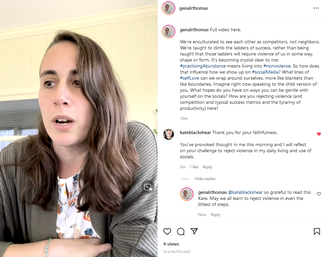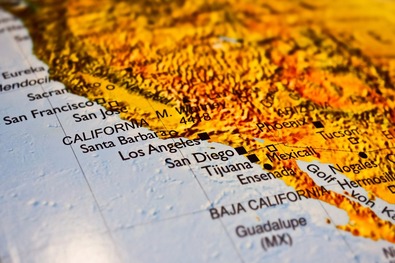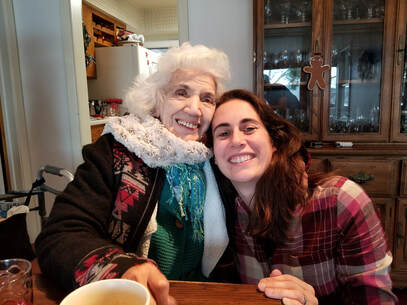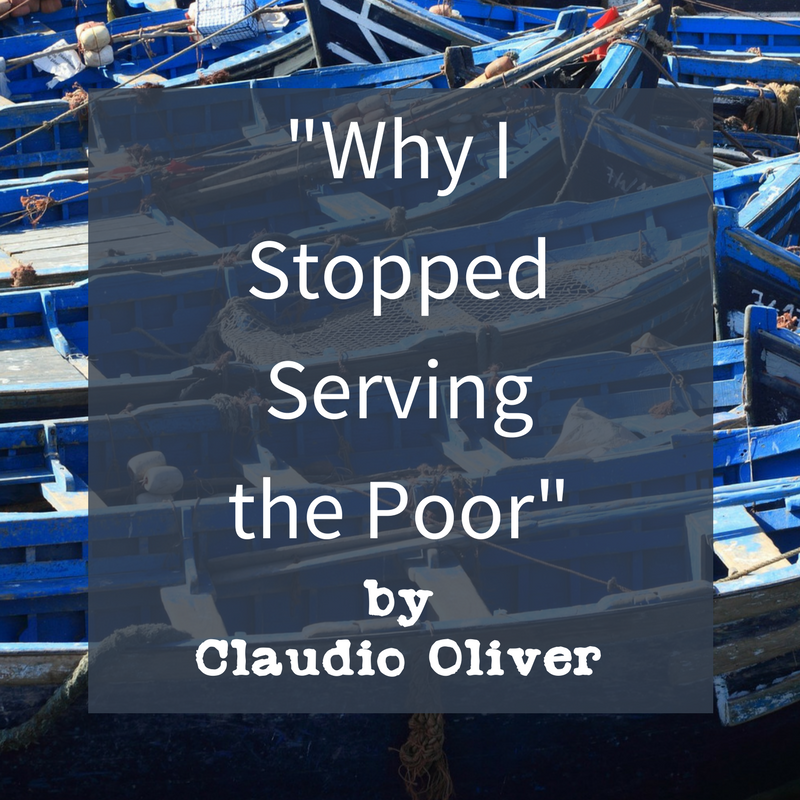|
GUEST POST by a friend of Gena's who prefers to remain anonymous
Ever since I became a mother, I have been questioned by strangers regarding my relationship with my kids. People have asked me things like, “Don’t you want to have your own kids?” and “Do you know much about his real parents?” I get these questions more often than other mothers because my children are Black and my husband and I are white; therefore, our interracial family doesn't look like it “matches.” My husband and I adopted our two children as infants through a domestic adoption agency. Ever since my husband and I started talking about adoption, I have tried to educate myself as much as possible on transracial adoption, especially because I knew that my Black children would grow up with vastly different experiences than I had. I have learned the most from listening to adult adoptees, especially those that were adopted transracially. One of the main messages I hear over and over is how much language matters, especially when heard by children. The following phrases and questions are some of the things we have been asked or heard from others. I would like to share some thoughts on how they can convey certain assumptions and suggest some more appropriate language to use in some situations. “Don’t you want to have your own kids?” When it comes to generalized discussions about why we chose adoption, we most commonly hear this question. In fact, many people use the phrase “your own kids” (referring to biological children) in one way or another. Even if well intentioned, the language can be hurtful. First, my two kids are fully my own and they have been since the day we adopted them. Second, this question implies that we are missing something in our family, and in order to be happy or complete as a family, having biological children is necessary. Most importantly, it sends a message to my kids that they are not enough or that they are a less-than replacement for biological children, which could not be further from the truth. I do not need to have biological children to feel complete. There isn’t really a good alternative to this question, so it is better left unasked. “Why did her mom give her up?” There are various versions of this question, including phrases like “give up/put up/give away a child for adoption.” These phrases actually originated from the orphan trains that operated in the United States, beginning in the 1850s. They transported homeless, orphaned, and runaway children from East Coast cities across the country to the Midwest to be adopted by families. After the train stopped in a town, orphan train children were often placed up on a stage in front of a crowd, which is the origin of terms like "put up for adoption." With the exception of a few rare cases, current domestic infant adoption looks very different. In most situations, the expectant mother/parents make a conscious decision to make an adoption plan for their child, and it is certainly not a casual “give up.” Personally, before we adopted our children, we decided we would keep their stories private, so they could each decide if, when, and with whom to share details about their adoption. Therefore, I never discuss the details of my children’s stories with others. That said, while I don’t feel there is ever a need for someone to ask this question, the correct phrasing when referring to an adoption decision would be “place for adoption” or “make an adoption plan.” “Thank you for adopting!” How many mothers of a biological child have ever been thanked by a stranger for birthing their child? I cringe when I am told this because it feels like it's implying that adoptive parents are “heroes for doing something wonderful for these children” (and sometimes it’s been accompanied by an explicit statement along such lines), and that mindset is definitely not the driving force behind why we adopted. I know that many Christians' hearts for adoption are animated heavily by James 1:27 (“look after orphans and widows”), but my husband and I did not pursue adoption primarily as an outpouring of that perspective. Rather, we felt that God had wired us—individually and as a team—in a way where adoption made the most sense for us, and we were truly thrilled to become part of our kids' (and their birth families') lives. I don't ever want my kids to feel like they needed saving or that we did something “noble” by adopting them—God had them in His hand and would have provided for them with or without us. We don't need to be thanked because we are by far the lucky ones to get to be their parents. If our kids' birth parents had decided to parent them instead of placing them for adoption, our kids would not have had a bad life, just a different life than the one they have now with us. “Thank you for being an advocate for orphans!” I understand the heart behind this statement. As Christians, we should absolutely support and advocate for all orphans to find permanent, loving families. The problem here is the assumption that adoption always involves orphans. The phrasing may be accurate with regard to most international adoptions, in which many of the children being placed with families are, in fact, orphans. But that is rarely the case with either foster-care-based adoption or, as in our case, domestic infant adoption. Most children placed through domestic infant adoption have loving birth families who thoughtfully and voluntarily chose adoption as the option that they believed to be best for their child (hopefully with education and counseling from a non-biased adoption agency case worker). The baby almost always still has a biological mother and father, and very often biological siblings and extended family members. I am grateful that my husband and I have very open relationships with both of our kids' birth families and we get to love, honor, respect, and celebrate that part of their lives every day. “I also want to adopt a child because we as Christians are adopted by God.” We often hear some version of this statement from others who are interested in adoption. Many people in the Christian church compare the adoption of a child with being "adopted" into the family of God through salvation in Jesus. They use phrases like "we adopted our child because God adopted us" and base their perspective off of verses like Ephesians 1:4-5 (“He predestined us for adoption to sonship”). The Biblical word “adoption”—as it relates to salvation—describes a person in the posture of being dead in transgressions, without hope, an enemy of God. Being adopted as a child of God reflects the new position of the person, no longer bound to the authority of sin but instead being transformed and having new life in Jesus as a child of God and the promise of heaven. The comparison of modern-day adoption to the Biblical form of adoption has been identified by adoptees as being inaccurate and problematic, as it places the adoptive parents in the "savior" role and implies the child was in a place where he/she needed “saving” from their birth family. This comparison is at best woefully imperfect and it can be hurtful toward the child’s birth family. While I will never doubt that God is in the details of every part of our lives, alternate language should be considered when describing the reasons for adopting. In summary I understand that people are curious when they make comments and ask questions like these, and they likely have good intent. But these statements convey underlying beliefs and perspectives, and they can have an impact on families, especially when made in front of a child who may subconsciously internalize them as part of his or her identity. The messages our kids hear from others influence how they view themselves. Adoption is always complex—and sometimes sensitive—and there are many different paths when it comes to adoption. This is why it’s all the more important that appropriate words be used. I believe that being cognizant of our language and the messages it communicates to others can make a big difference in how we understand ourselves and our relationships with those around us. For reflection:
0 Comments
 On Sunday, during church, I just kept thinking about how Jesus chose to appear to women first when he rose from the dead. I couldn't stop thinking about it. I love thinking about this, and the other ways in which Christ uplifted the dignity of women, and knew them all by name: the woman at the well, the woman who was about to be stoned, the woman and her perfume, his mother, Lazarus' sisters, all the little girls that were included in 'let all the children come to me,' the woman who touched his cloak to heal her bleeding. (Please share the ones I'm missing!) I love how Christ decides that this very bold and scandalous truth of his return should be entrusted to the women who were not even thought of to be entrusted with such matters.This week was UNICEF's International Day of the Girl Child, and it reminded me of the dream I have that girls will one day be accepted as the professional, political, and spiritual leaders they have been gifted to be. I want my daughter to grow up not only knowing she can be anyone she wants, but seeing that represented in the world around her. I want that for all the daughters around the world. According to the UN World's Women 2020: Trends and Statistics, we have a lot of work to do: In 2020, only 47% of women of working age go to work, while 74% of men of working age go to work.Typically, women spend 3x as much time on unpaid domestic and care work as men. In some areas, it's 7x as much. Women hold less than 30% of managerial positions (data from 2019), and sadly this number hasn't changed since 1995! About one third of women have experienced physical and/or sexual violence by intimate partners, with over 130 women being murdered by an intimate partner or family member every day. I recently read the classic Their Eyes Were Watching God by Zora Neale Hurston and what struck me most was how differently the majority of the men talked about treating imaginary women compared to how they treated the actual women in their lives. For me, learning to see God as Mother has allowed me to imagine God as fully understanding the female experience: the subjugation, the objectification, the heavier workload, the toll on the body of wanting a child, having a child, not having a child, or not wanting to be pregnant, the domestic violence, subordination in the workplace, misogyny and patriarchy (even and especially in theology), the cat calls, the self doubt, the worry about being seen as beautiful, the tension of living up to others' expectations of what a woman should be. Under the shadow of God's wings, women are there, protected, cared for, advocated for, given voice, given autonomy, given the scandalously good news that their lives matter not just because of how they are (or are not) relationally tied to a father or a husband. These are the women of God, seen and heard and represented in God Herself. God bless the life of Gina Ruocco—sister, mother, daughter & grandmother.
God bless the husband of 60 years, and the life and the family, both nuclear and extended that lived in the home. God bless the love between that extended so wide. God bless the twin brother and sister who shared in so many memories, gave and received so much love, and demonstrated mutual loyalty & support & care & respect despite the very different paths they took. God bless the sister who remains, the sister who mothers a city—who learned mothering, at least in part, from her. God bless the brother in law who went before her and gave her so much agita and loved her deeply. God bless the friend turned sister-in-law who died too young and asked her to mother her child. I would not know her as grandma if she didn’t. God bless the families that came from her four children — those children of 179 West Water Street, Little Italy, who threw tomatoes, stole candy, randsacked a cop car’s megaphone, and always behaved in class when the nuns were present. Who grew up to be loving and loved by their families and communities. God bless the home built after the flood that never knew a day without her, because she oversaw its construction by her husband. God bless the overgrown arborvitae trees that she loved and stared at from the outdoor porch. The outdoor rugs, the clothes line and the giant fountain. God bless the grandchildren, who made her proud and made her laugh, and gave her such joy. God bless the great grand children who got their cheeks pinched and may never fully know the glory of her cooking and her sassing and her giant smile. God bless the grandchild who lived with her, took care of her, asked her questions to counteract her worry, and who, even in the third decade of his life, knew to be home at curfew. And knew not to touch the decor. God bless every person who ever ate her cooking. And any who tried to get her to teach them how to replicate her recipes—a pinch there, a cup (not a measuring cup!) here, a handful of this. God bless her caregivers. And the pizzeria staff who reached and drove and retrieved and received such endearing nicknames. God bless HomeGoods—maybe. God bless the life of the woman I was named after who often reminded me that even after she passed, “there will always be a Gina around.” God bless the fact that DNA isn’t the only way to be family. God bless Gina Cecelia — known affectionately by her siblings as Jean, by her children as Mom, and by the generations that followed as Meema.  From my IG video you can find here. I have a confession to make. I’ve acted violently against myself in showing up on social media. I found myself comparing my life, my writing, my house, my décor, my makeup, my theology with a lot of others on here, especially on Instagram. What I often found was jealousy not joy. Competition not connection. I was getting so overwhelmed with life, work, and being an author, that I decided it wasn’t good for my mental health. So I cut down my Instagram following and my followers not long after my second book came out. I’ve wrestled with continuing to show up there, a lot. But I’ve done quite a bit of work to learn how to belong to myself (I’m still learning), and how to be confident in what I offer and what I hope for from others. So I’m going to try to show up a bit differently moving forward. Videos aren’t something I’ve done a lot, and part of that was due to low self love. But that’s an area I’ve been working hard at too. I like the person I see in the mirror, not just my mind, but my body too. There’s room to grow but I’m on a trajectory I’m proud of. Moving forward with social media videos, I’m going to read what I write. I don’t have time to memorize, and I’m not the best at going off the cuff. I’m OK with that. I work a full time job, and I have two kids, a dog, and cat, a bunch of plants, and I’m a spouse. I think that success from a prosperity mindset says I need to memorize and make this perfect, but I don’t think it’s fair to make this more than I should to myself, my kids, or my spouse. And I want to spend time with them. In fact, I’ve come to believe it’s violence against myself and my dearest ones to place so much pressure on what I produce because the tyranny of production is never satisfied. I’m going to show up sometimes with makeup and my hair done, but most of the time not. Because that’s real life. I’m going to share my thoughts and be as fully human as I can be. I just got home from giving a talk about Violence and Victory (based on my Violence & Victory article at Red Letter Christians) – my premise is that if we seek victory rather than justice we will never actually find shalom. Victory is individualized. Victory presupposes a winner and a loser. This is what studying God’s abundance has shown me. I’ll get more into it in the coming videos, but for now, I just want to confess that as a writer and speaker, I often find myself seeking victory. It’s easier than seeking justice. It’s what a lot of people are doing because we’re told it’s the only way. Victory is a bigger platform, a larger following, another book contract, etc. But when we seek the best for ourselves above all else, we lose ourselves along the way. We have to reject this if we really believe in collective abundance, in the flourishing of all. What does victory look like for you in your arena of life? In what ways does that provoke you to look at others around you as competition rather than as neighbors? I’m going to work towards being nonviolent to myself even on social media. I’ve long turned off notifications and been mindful of my time on the socials, but there’s more that can be done. And I need to find a way to practice abundance even here. I hope you can find ways to practice it in whatever spaces you are a part of too. If you’re feeling it, comment below and name one way you can reject the violence of social media? This guest post is written by Eliza Stewart. Eliza (she/her) is a young South African with a USA passport taking a year between high school and the rest of her life to do some travelling, learning, and listening.  What does it mean to travel to a place, not to consume it, but just to be there? I don’t want to go somewhere because I feel entitled to because my mom was born within the borders of the “USA” and I have access to it legally because of my passport. I want to think about the places I’m going beyond what they can do for me and my gap year. I will grow more from my gap year if it is not completely focused on me, which might seem ironic to those of us who’ve been taught gap years are meant for us to find ourselves. I just finished reading Harsha Walia’s book Border & Rule, a book which investigates the function of borders - politically, socially, culturally and economically. And as a South African currently traveling in the USA so much around me has me thinking about borders. Thinking about how easily I move through borders. Thinking about why I am, because of my identity as a white person and a USA citizen, permitted to move so easily through borders. Thinking about the whole system. As a child you don’t really think about countries and borders and the whole system as anything but natural, but Walia and others have shown me a different way. Walia explains that the function of borders is to restrict the movement of people, while the movement of capital and goods is ensured. People are declared illegal, while the surplus value they produce never is. Humans and land are turned into commodities (made for exchange). The conversion of land into property is directly related to the conversion of people into property. Movement across borders, legal or illegal, is used in service of capitalists to accumulate capital. The border does not work against globalised capital, it works in service of it. Free capital requires bordered and immobilised labour. She says: Borders do not protect labor; the border is a bundle of relations and mode of governance acting as a spatial fix for capital to segment labor... Simply put, borders manufacture divisions within the international working class. Borders are exploited by the class-conscious ruling class through outsourcing and insourcing to weaken collective bargaining rights and working-class resistance to transnational capital and its austerity measures. One of my favourite YouTubers, Saint Andrew, quotes in his Abolish Borders video “The border is not just a wall. It’s not just a line on a map. It’s not any particular physical location. It’s a power structure, a system of control. The border is everywhere that people live in fear of deportation, everywhere migrants are denied the rights accorded citizens, everywhere human beings are segregated into included and excluded. The border does not divide one world from another. There is only one world, and the border is tearing it apart… In our ‘free’ and ‘post-colonial’ world what was once the norm is now criminalized...There is nothing necessary or inevitable about borders.” One example where this is happening is in Hawai’i. Indigenous Hawai’ians have been saying that they don’t want tourists on their land, especially right now. Hawai’ians are being asked to reduce their water usage due to intense water shortages while tourists are allowed to move freely over the land consuming and consuming. Hawai’i is seen as nothing but a pretty backdrop, and the people props, for vacations. It is the most basic level of respect to not travel to Hawaii right now, yet thousands of tourists are. I don’t want to be like them or think like them that I am entitled to go somewhere just because the border allows me to. (This is an amazing video from Haunani-Kay Trask that shows her response to the US American occupation of Hawai’i and her identity as a Hawai’ian). When I am old, I will tell you I remember learning about freedom beyond anthems and passports. And how we never went back once we knew the kind of love bound only by shorelines, prairie skies, and forest floors.” How do I travel through the world as one member of the tiniest group that has open access to the world’s borders? How do I travel not just being aware of the power I have because of how I am racialised, but as someone humbly coming into spaces as a guest? How do I interact with the world with all of these thoughts of borders, and entitlement, and division coming together? I don’t want to be an entitled traveler. I don’t want my gap year to be predatory. I don’t want to gain my own feelings of independence and growth through the harm of others. I don’t want people and places to just serve as props for my journey. I just don’t really know how to do this well. “In this new space one can imagine safety without walls, can iterate difference that is prized but unprivileged, and can conceive of a third, if you will pardon the expression, world ‘already made for me, both snug and wide open, with a doorway never needing to be closed.’ Home.” If you have thoughts about any of this, I would love to hear and discuss, email me elizacamillestewart@gmail.com or message me on IG @lizatiser.
Unbelonging uncovers the stepping stones that are invisible in belonging. Every time we are excommunicated, pushed away, pushed out, or told we don’t fit in. Every time we feel angst over the social boundaries we’re told we must abide by, we have begun the journey to see these stepping stones that give us a new perspective of Christ. For Christ, belonging is never transactional. Belonging has always been unconditional.
And this is the most radical, controversial, mind-blowing aspect of Christianity — the abundance of God in belonging. There are no prerequisites to begin the journey or even along the way. There is abundance of belonging for every step, every misstep, every part of the journey. Scarcity and prosperity have no room in Christ’s kingdom, because those identifiers are codependent on accolades, possessions, and checklists. And those identifiers dichotomize the whole of the human race: you either have it and are prosperous or you don’t. God’s abundance redefines what identity even is, and every unbelonging unveils more and more of this truth. But it requires a deep letting go of the things we thought we did for ourselves. We cannot hold onto our trophies, our accomplishments, our belief systems, or our good deeds. Authentic, abundant belonging has no relation to those measurements. This is absolute freedom. And, absolute sadness simultaneously to people whose identity is so wrapped up in accomplishment that the Good News of this abundance is deeply difficult news to their egos. It is in the unbelonging, we learn to truly belong to Christ, who is always bent toward us. The question is, will we lay down our bent toward prosperity so that we can accept this true belonging? For workers struggling to find pay, struggling to find consistent work, struggling to move beyond survival, extra stressed by their circumstances, reveal your presence to them so they know they don’t walk alone.
Be their Jehovah Shammah. Lord, hear our prayer. For those out of work, struggling to find it, feeling underwater as their dignity and identity are so closely connected to the reality of having it, be their Jehovah Bore, Elohim, and remind them that their worth comes from the dignity You’ve already given. Lord, hear our prayer. For workers being exploited — sexually, economically, racially, because of immigrant status or otherwise, Lord protect them. Hedge their intrinsic value, their families, their bodies and minds. Be their Jehovah Sabaoth. Lord, hear our prayer. For children, spouses, and friends, siblings, and parents who depend on these workers, Lord, provide for these families. Be their Jehovah Jireh. Change laws & oppressive policies, infuse empathy in those who have power over these. Be Jehovah Nissi, make yourself known to the workers, their families, their employers and politicians. Lord, hear our prayer. For the dignity innate in every human being For the everlasting love you so freely give, Lord, let these workers experience and know and feel-- You are near and You are love; You care, and You lead to green pastures. Be their Jehovah Rohi. Lord, hear our prayer. And for those who can advocate on their behalf, work toward their communal good, open up opportunities for flourishing, connect resources and networks — equip them for this good work. Energize them with your ever-flowing love, forgive them of any haughty thoughts, and let them learn as much as they teach, receive as much as they give, challenge as much as they encourage. Be our Jehovah Adonai. Lord, hear our prayer. Amen If you struggle during this season to stay focused on Christ and his birth because of all of the distractions of commercialism starting with Black Friday and leading right up to December 25, Covid logistics for get-togethers, the perfect presents for every so-and-so, you are not alone. I used to get so frustrated during this season because it seems to not be about Christ at all (I wrote a blog post in my early 20s called why I hate Christmas.) But then I learned about Advent — and the church calendar in general — and it's given me a way to stay focused on Christ.
I've created a Nouns & Verbs Advent 2020 calendar as a mini morning devotional for 25 days leading up to the day we celebrate Christ's birth. Little prompts to go with each day. I'll be sending it out December 1 in my monthly newsletter, so sign up by November 30 on my homepage: genathomas.com  A prayer for the [Christian] political other-- Lord bless the Christian who votes differently than me. Open their—I mean our—eyes to see the bigger picture. Teach me not to dehumanize Teach me not to judge their humanity while opining on their choices. Lord bless the one who votes differently than me, and help me to mean this prayer. Yes, help me to mean this prayer. May I see Your Imago Dei in him, and may he see it in me. But even if he doesn't, Lord bless the one who votes differently than me. Let both of us use our votes for your goodness, for communal flourishing, and let our lives speak the sermons that move mountains. Give both of us wisdom to draw boundaries, but not build walls. Yes, Lord bless the Christian who votes differently than me, and bless me with this desperately needed grace. Amen.  Don’t wait until you have thousands of followers, a large platform, publishers that automatically say yes before you do these things. DO THEM NOW. If we wait till we are famous, we are adding to the injustices of the publishing world. Let’s start now in changing our culture. If we don’t learn to strive for everyone’s flourishing prior to our own “success” it will be so much harder when we get to wherever we are trying to go. So if you only have 20 followers, you’ve come at the right moment. And as you continue on this journey invite others to do the same. I’m not perfect in any of these things. I’ve messed up, I’ve forgotten. I’ve not been intentional. But these are the things I’m striving to do, and send me an email if you think I can do better with specific steps for me to follow. If you have more ideas on how to do so, and you don’t mind me publishing your name, please share in the comments or email me. I will add them!
|
Gena's
|





 RSS Feed
RSS Feed

